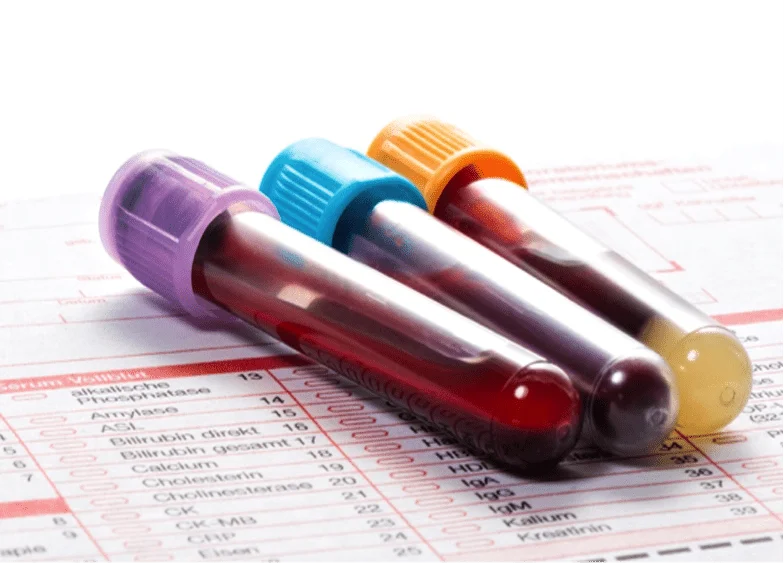The Anaemia Profile Blood Test is designed to diagnose and evaluate different types of anaemia by assessing key blood parameters and underlying causes of anaemia. Anaemia is a condition characterized by a deficiency in the number of red blood cells (RBCs) or haemoglobin, leading to reduced oxygen transport throughout the body. This profile helps identify the type of anaemia (e.g., iron deficiency, vitamin B12 deficiency, or anaemia of chronic disease) and guides treatment decisions.
Blood Test Cost – £159
Tests in an Anaemia Profile Blood Test:
1. Full Blood Count (FBC) / Complete Blood Count (CBC)
- Purpose: Provides a comprehensive overview of blood components.
- What It Measures:
- Haemoglobin (Hb): The protein in red blood cells that carries oxygen.
- Haematocrit (Hct): The proportion of red blood cells in the blood.
- Red Blood Cell Count (RBC): Measures the number of red blood cells.
- Mean Corpuscular Volume (MCV): Average size of red blood cells. Helps determine the type of anaemia (microcytic, normocytic, or macrocytic).
- Mean Corpuscular Haemoglobin (MCH): Average amount of haemoglobin in red blood cells.
- Mean Corpuscular Haemoglobin Concentration (MCHC): Concentration of haemoglobin in red blood cells.
- White Blood Cell Count (WBC): Helps assess if there is an infection or inflammatory process.
- Platelet Count: Evaluates clotting ability.
2. Serum Ferritin
- Purpose: Measures the amount of ferritin, a protein that stores iron in the body.
- Why It’s Tested: Low ferritin levels are a key indicator of iron deficiency anaemia. Ferritin is one of the most sensitive markers for assessing iron stores in the body.
3. Serum Iron
- Purpose: Measures the amount of iron in the blood.
- Why It’s Tested: Low iron levels indicate iron deficiency, while high levels can suggest iron overload disorders like hemochromatosis.
4. Total Iron Binding Capacity (TIBC)
- Purpose: Measures the blood’s capacity to bind and transport iron.
- Why It’s Tested: Elevated TIBC is often seen in iron deficiency anaemia, as the body increases its capacity to bind iron when levels are low. Low TIBC can be a sign of chronic disease anaemia or iron overload.
5. Vitamin B12 Levels
- Purpose: Measures the level of vitamin B12 in the blood, which is essential for red blood cell production.
- Why It’s Tested: Low vitamin B12 levels can lead to megaloblastic anaemia, a condition in which red blood cells are larger than normal and cannot function properly. Vitamin B12 deficiency is often due to pernicious anaemia or dietary insufficiency.
6. Folate Levels (Vitamin B9)
- Purpose: Measures the level of folate, another vitamin essential for red blood cell production.
- Why It’s Tested: Folate deficiency can also cause megaloblastic anaemia, similar to vitamin B12 deficiency. Folate deficiency is common in malnutrition, alcoholism, and pregnancy.
Types of Anemia Diagnosed by an Anaemia Profile Blood Test:
- Iron Deficiency Anaemia:
- Most common type of anaemia.
- Caused by a lack of iron, often due to poor diet, blood loss (e.g., heavy menstruation or gastrointestinal bleeding), or increased demand (e.g., pregnancy).
- Vitamin B12 or Folate Deficiency Anaemia:
- Caused by insufficient intake or absorption of vitamin B12 or folate.
- Leads to megaloblastic anaemia, where red blood cells are abnormally large and immature.
- Anaemia of Chronic Disease:
- Caused by long-term medical conditions such as chronic infections, autoimmune diseases, or cancer.
- The body’s iron stores may be normal, but inflammation prevents the body from using the iron to produce red blood cells.
- Haemolytic Anaemia:
- Caused by the premature destruction of red blood cells.
- Can be due to autoimmune conditions, infections, or inherited conditions such as sickle cell disease or thalassemia.
- Aplastic Anaemia:
- A rare but serious condition where the bone marrow fails to produce enough red blood cells.
- Often due to damage from radiation, chemotherapy, or certain medications.
Importance of an Anaemia Profile Blood Test:
The Anaemia profile blood test is essential for diagnosing the type and cause of anaemia. Early diagnosis and appropriate treatment are crucial to prevent complications such as fatigue, organ damage, and in severe cases, heart failure. Treatment depends on the underlying cause of anaemia and may include iron supplements, vitamin B12 or folate injections, treatment of underlying diseases, or more advanced therapies such as blood transfusions or bone marrow transplants in severe cases.
Results – 8 hours from Laboratory receiving sample







